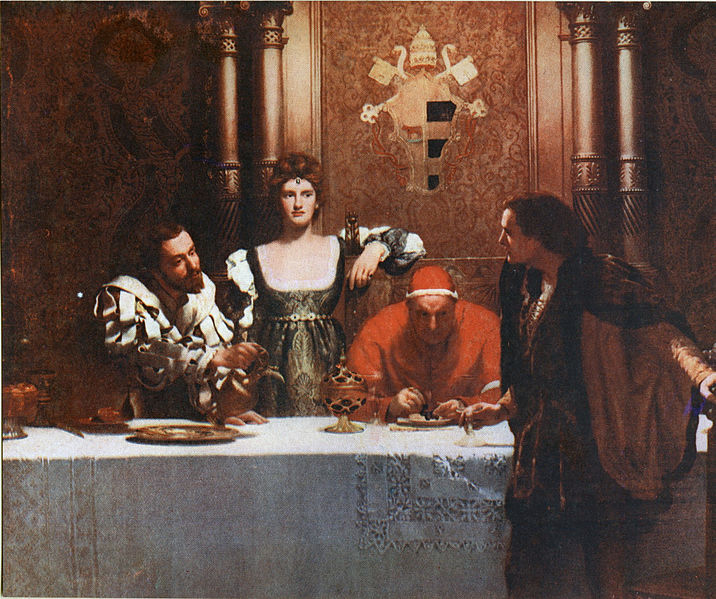Whenever a Catholic dares to critique the all-too-frequent supineness of non-Catholic Christian religious bodies towards their respective nation states, an angry accusation of hypocrisy inevitably follows. What about the Renaissance Popes! What about that damned Borgia! (You mean Saint Francis Borgia? Wow, I love him too!)
And it seems to me that this rather misses the point. Yes, yes, a thousand times yes, the Renaissance Papacy was venal and corrupt and meretricious. And uniting Christendom by the sword is both a terrible idea (as the inevitable blowback of the Reformation showed) and a betrayal of the Gospel.
But, see, here’s the thing. Jesus called himself “Son of God” and his followers called him “Lord”–both titles which, in the Roman world, applied to the Emperor. Jesus is supposed to be Lord of the Universe, but this Lordship is meant to be realized through His Church. The Gospel is both a denunciation of political power and an assertion of Christian–that is to say, ecclesial–power over the political realm. The most important moment in the history of Christendom was when St Ambrose of Milan excommunicated the Western Roman Emperor Theodosius for committing atrocities and mandated him penance–and Theodosius, instead of simply having Ambrose beheaded, as any sovereign in the history of humanity heretofore would have seen as the perfectly legitimate and called-for option, repented. This is what it is supposed to be like. The Church’s job is to produce Canossas.
In other words, as Boniface VIII put it before being essentially martyred for it, it is necessary for salvation that every soul be subject to the Roman Pontiff. Civil power exists and is appointed by God to fulfill duties within their own sphere, but only by delegation of the true Lord of the Universe, who is Jesus Christ, and whose Vicar is the Bishop of Rome. The two swords are in the hands of Peter. The divine plan of salvation is for all of humanity to be united under the benevolent rule of the universal apostolic Church.
Because let’s face it, if the institutional reality of the Church is not transnational–as only the Roman Church is–then its institutional reality will be national; and in that case, in a contest between a national church and a national state, the national state always wins, as history tells us over, and over, and over again. The localized and intermittent instances when Catholic institutions were too subservient towards a state only reinforce the point: if, with its transnational structure and Pontiff, Catholicism stumbles so often, this only highlights how hard it is for any ecclesial body to resist the combination of lure and violence of political power, and how all the more necessary, then, it is for the Church’s principle of unity to stand above the world’s nations and rulers.
Let us get back, then, to our Renaissance Popes. Their main corruption was to use the power of the sword and politics to try to rule the world. But see, here’s the thing. As much as they got the how, the means, wrong, and however much personally corrupt they were, their instinct was right: that the rulers of this world should bow to the Pope of Rome with fear and trembling, that the power and principalities of this world should be bound to the will of Christ. Again–the way they went about pursuing that objective was wrong. The Church should only “enforce” compliance through evangelism, because if it does so through coercion, it corrupts itself and betrays the Gospel–the ends do not justify the means.
But even as he had the means wrong, when Julius II rode out with his army, he had the instincts right. And I will take Julius II over Cranmer and the Reichskirsche and “symphony” and James Henley Thornwell. Catholicism has a lot to repent for; but there is a difference between a Church where Caesaropapism is the exception, and churches where it is the rule.












